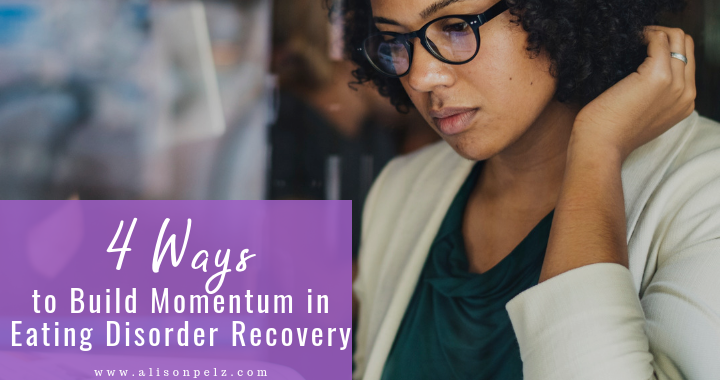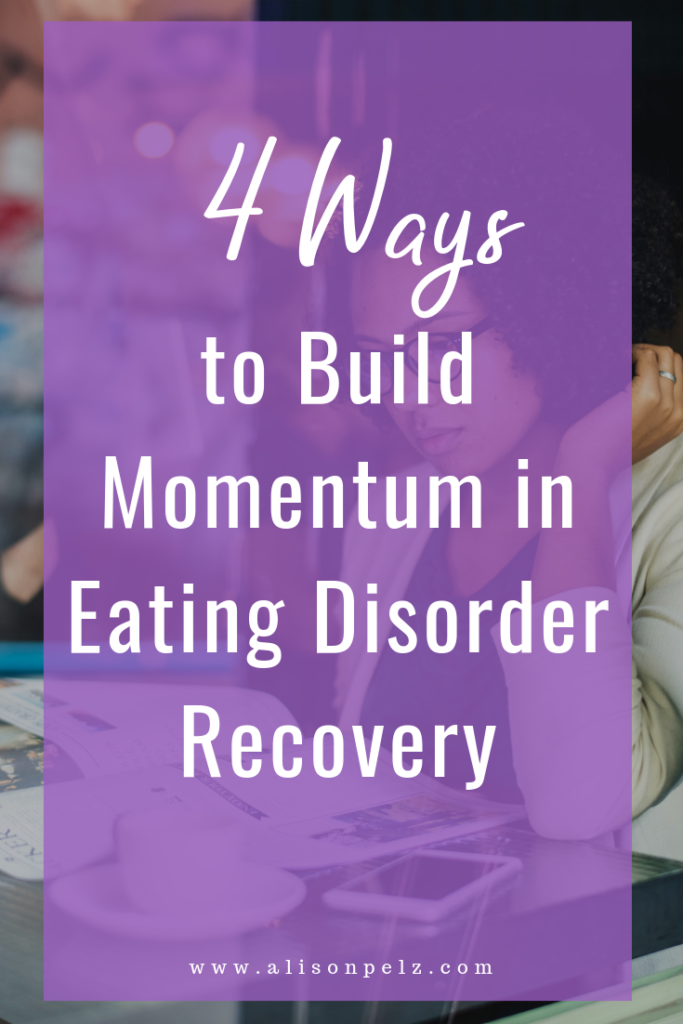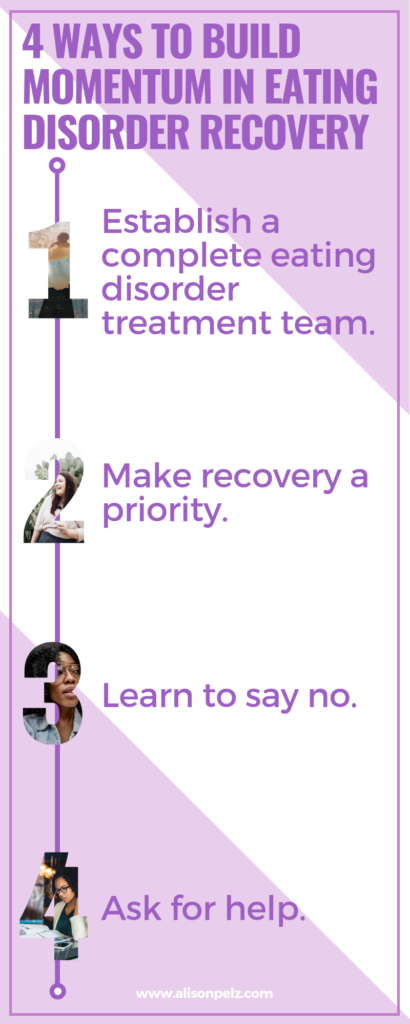Are you just starting out on your recovery journey? Or have you been in treatment for a while and feel like your recovery is stalled? You’re not alone.
Here are four tips to help build momentum or re-energize your eating disorder recovery.
Establish a complete eating disorder treatment team.
Without professional treatment, eating disorders tend to get worse, not better.
Unfortunately, getting inadequate treatment, such as stopping treatment prematurely or having an incomplete treatment team, happens all too often. It can lead to hopelessness about ever recovering, slow down recovery or lead to recovery burnout.
The gold standard of care in eating disorder treatment is to have a multidisciplinary team. An eating disorder treatment team usually consists of a therapist, registered dietitian, medical doctor, psychiatrist, family therapist, and possibly other specialists. Click here to learn more about how to find a therapist and establishing a treatment team.
Make recovery a priority.
Recovery can feel like a full-time job, which can be downright exhausting. Eating disorder recovery is definitely a marathon and not a sprint. It takes time to understand how the eating disorder serves you and to establish new healthier patterns to cope with life.
Recovery doesn’t happen in a vacuum. Recovery happens while you are in school or working and involved with family, friends, and hobbies. So, it is easy for recovery to be put on the back burner given all of the obligations you may be juggling.
Making recovery a priority is important because without recovery, your eating disorder negatively affects all areas of your life occupation or school, relationships, physical and mental health, and overall quality of life.
Having acceptance that recovery is going to take time and energy is a good first step to making it a priority. Carving out time in your day for self-care, meal planning, eating, rest, and treatment appointments can help you feel less overwhelmed.
Learn to say no.
This is a tough one for me and so many of my clients. Sometimes saying yes is like a reflex because it is so automatic.
Learning to say no is a must in order to make recovery a priority. Furthermore, you may learn in treatment that saying yes too much may be contributing to or exacerbating your eating disorder symptoms.
Not setting firm boundaries can lead to feelings of hopelessness, worry, anger, and resentment, to name a few negative emotions. When we over-extend ourselves, often eating disorder behaviors are used to cope.
Although there are several reasons why people struggle with saying no, often fear is the primary culprit. You may fear missing out, hurting others feelings, appearing selfish or rude, being judged, and feeling rejected.
Learning how to set boundaries takes lots of practice, so be patient with yourself. If you notice that you struggle in saying no, discuss this with your therapist and other treatment providers.
Ask for help.
Working on your eating disorder recovery is something that you are responsible for. However, that doesn’t mean that you have to do it alone.
As you know, loved ones can’t eat for you or attend your appointments for you, but they certainly can support you in your recovery in many different ways.
As you go through recovery, you are going to need help, and that is okay. Often, part of what keeps people stuck in the eating disorder is isolation and feeling like they have to recover alone.
Barriers to asking for help often include fear of appearing weak, feelings of shame or guilt, or worry about burdening others. Your fears most likely are unfounded, as most people like to help others.
So what does asking for help in recovery look like?
Well, at different times in your recovery, it could mean different things. But, for some, it could be eating a meal with someone, it could mean being social, or it could mean simply talking.
It could also mean asking loved ones to learn more about eating disorders or attending a family therapy session or doctor’s appointment.
Consider making a list of people whom you could ask for help by asking yourself, “Who has my best interest at heart and who believes in me?”. Having some people in mind ahead of time can make it easier to ask for help.
Lastly, don’t feel like you have to be in crisis to ask for help. If you have any inkling that you may need help, reach out. Sometimes just the act of reaching out and talking to someone can be supportive.
The recovery road is always bumpy. But, having a strong treatment team as a foundation, making recovery a priority, setting firm boundaries, and calling on loved one for support can often make the bumps feel more manageable.


